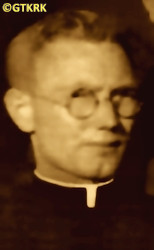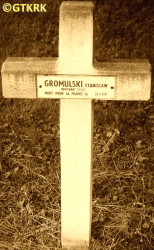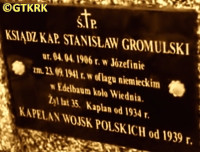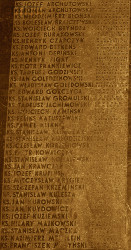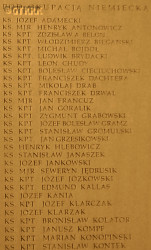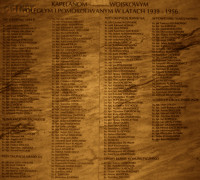Roman Catholic
St Sigismund parish
05-507 Słomczyn
85 Wiślana Str.
Konstancin deanery
Warsaw archdiocese, Poland
full list:
displayClick to display full list

searchClick to search full list by categories
wyświetlKliknij by wyświetlić pełną listę po polsku

szukajKliknij by przeszukać listę wg kategorii po polsku

Martyrology of the clergy — Poland
XX century (1914 – 1989)
personal data
surname
GROMULSKI
forename(s)
Stanislav (pl. Stanisław)
function
diocesan priest
creed
Latin (Roman Catholic) Church RCmore on
en.wikipedia.org
[access: 2014.09.21]
diocese / province
Warsaw archdiocesemore on
en.wikipedia.org
[access: 2013.05.19]
RC Military Ordinariate of Polandmore on
en.wikipedia.org
[access: 2014.12.20]
date and place
of death
23.09.1941

Oflag XVII‐A EdelbachPOW camp for officers
today: Zwettl dist., Lower Austria state, Austria
more on
en.wikipedia.org
[access: 2016.03.14]
alt. dates and places
of death
07.07.1942 („official” date)
details of death
On 01.01.1939 drafted to Polish Army as reserve chaplain.
In 08.1939 mobilized in 2nd Legions Infantry Division of „Łódź” Army.
After German and Russian aggression of Poland in 09.1939 and start of the World War II took part in battles with Germans, n. Modlin among others, and next crossed over to Hungary.
There interned.
Became chaplain to the Polish refugees in Budapest.
Next moved to France and became chaplain to the 2nd Infantry Rifle Division of Polish Armed Forces formed there.
Participant of French–German War of 06.1940, in particular of Clos du Doubs hills battle with Germans on 18‐19.06.1940.
On 22.06.1940 captured by the Germans and made POW.
Jailed in POW Oflag XVII‐A camp in Edelbach in Austria.
There perished in a local camp hospital No. 208.
prisoner camp's numbers
15516 (Oflag XVII A EdelbachClick to display the description)
cause of death
extermination: exhaustion and starvation
perpetrators
Germans
sites and events
Oflag XVII A EdelbachClick to display the description, Ribbentrop‐MolotovClick to display the description, Pius XI's encyclicalsClick to display the description
date and place
of birth
04.04.1906Birth certification on:
photos.szukajwarchiwach.gov.pl
[access: 2025.08.19]

Józefintoday: Jakubów gm., Mińsk Mazowiecki pov., Masovia voiv., Poland
more on
en.wikipedia.org
[access: 2022.01.28]
parents
GROMULSKI John
🞲 ?, ? — 🕆 ?, ?

KONCA Anne
🞲 1880, ? — 🕆 08.09.1963, ?
baptism
05.04.1906Birth certification on:
photos.szukajwarchiwach.gov.pl
[access: 2025.08.19]

Jakubówtoday: Jakubów gm., Mińsk Mazowiecki pov., Masovia voiv., Poland
more on
en.wikipedia.org
[access: 2025.09.17]
St Anne RC church
presbyter (holy orders)
ordination
26.05.1934

Warsawtoday: Warsaw city pov., Masovia voiv., Poland
more on
en.wikipedia.org
[access: 2021.10.09]
St John the Baptist Martyrdom RC archcathedral churchmore on
pl.wikipedia.org
[access: 2014.11.14]
positions held
from 1939
vicar — Żyrardówtoday: Żyrardów urban gm., Żyrardów pov., Masovia voiv., Poland
more on
en.wikipedia.org
[access: 2022.01.28] ⋄ Blessed Virgin Mary of Consolation RC parish ⋄ Mszczonówtoday: Mszczonów gm., Żyrardów pov., Masovia voiv., Poland
more on
en.wikipedia.org
[access: 2021.03.16] RC deanery
1938 – 1939
vicar — Okuniewtoday: Halinów gm., Mińsk Mazowiecki pov., Masovia voiv., Poland
more on
en.wikipedia.org
[access: 2022.08.05] ⋄ St Stanislav Kostka the Confessor RC parish ⋄ Warsaw‐Praskideanery name
today: Warsaw city pov., Masovia voiv., Poland RC deanery
1937 – 1938
vicar — Radzymintoday: Radzymin gm., Wołomin pov., Masovia voiv., Poland
more on
en.wikipedia.org
[access: 2022.01.10] ⋄ Transfiguration of the Lord RC parish ⋄ Radzymintoday: Radzymin gm., Wołomin pov., Masovia voiv., Poland
more on
en.wikipedia.org
[access: 2022.01.10] RC deanery
1934 – 1937
vicar — Mogielnicatoday: Mogielnica gm., Grójec pov., Masovia voiv., Poland
more on
en.wikipedia.org
[access: 2022.01.28] ⋄ St Florian the Martyr RC parish ⋄ Goszczyntoday: Goszczyn gm., Grójec pov., Masovia voiv., Poland
more on
en.wikipedia.org
[access: 2021.03.16] RC deanery
1934
vicar — Lesznotoday: Leszno city pov., Greater Poland voiv., Poland
more on
en.wikipedia.org
[access: 2021.07.18] ⋄ St Nicholas the Bishop and Confessor RC parish ⋄ Lesznotoday: Leszno city pov., Greater Poland voiv., Poland
more on
en.wikipedia.org
[access: 2021.07.18] RC deanery
till 1934
student — Warsawtoday: Warsaw city pov., Masovia voiv., Poland
more on
en.wikipedia.org
[access: 2021.10.09] ⋄ philosophy and theology, Metropolitan Theological Seminary
sites and events
descriptions
Oflag XVII A Edelbach: German POW camp for officers Oflag XVII‐A in Edelbach village (today not existent), by Allentsteig and Döllersheim villages, in north‐east Austria (Lower Austria). Set up in 1940 after French‐German war mainly for French POWs and few hundreds of Poles — altogether c. 6,000 prisoners. (more on: en.wikipedia.orgClick to attempt to display webpage
[access: 2016.03.14])
Ribbentrop‐Molotov: Genocidal Russian‐German alliance pact between Russian leader Joseph Stalin and German leader Adolf Hitler signed on 23.08.1939 in Moscow by respective foreign ministers, Mr. Vyacheslav Molotov for Russia and Joachim von Ribbentrop for Germany. The pact sanctioned and was the direct cause of joint Russian and German invasion of Poland and the outbreak of the World War II in 09.1939. In a political sense, the pact was an attempt to restore the status quo ante before 1914, with one exception, namely the „commercial” exchange of the so‐called „Kingdom of Poland”, which in 1914 was part of the Russian Empire, fore Eastern Galicia (today's western Ukraine), in 1914 belonging to the Austro‐Hungarian Empire. Galicia, including Lviv, was to be taken over by the Russians, the „Kingdom of Poland” — under the name of the General Governorate — Germany. The resultant „war was one of the greatest calamities and dramas of humanity in history, for two atheistic and anti‐Christian ideologies — national and international socialism — rejected God and His fifth Decalogue commandment: Thou shall not kill!” (Abp Stanislav Gądecki, 01.09.2019). The decisions taken — backed up by the betrayal of the formal allies of Poland, France and Germany, which on 12.09.1939, at a joint conference in Abbeville, decided not to provide aid to attacked Poland and not to take military action against Germany (a clear breach of treaty obligations with Poland) — were on 28.09.1939 slightly altered and made more precise when a treaty on „German‐Russian boundaries and friendship” was agreed by the same murderous signatories. One of its findings was establishment of spheres of influence in Central and Eastern Europe and in consequence IV partition of Poland. In one of its secret annexes agreed, that: „the Signatories will not tolerate on its respective territories any Polish propaganda that affects the territory of the other Side. On their respective territories they will suppress all such propaganda and inform each other of the measures taken to accomplish it”. The agreements resulted in a series of meeting between two genocidal organization representing both sides — German Gestapo and Russian NKVD when coordination of efforts to exterminate Polish intelligentsia and Polish leading classes (in Germany called «Intelligenzaktion», in Russia took the form of Katyń massacres) where discussed. Resulted in deaths of hundreds of thousands of Polish intelligentsia, including thousands of priests presented here, and tens of millions of ordinary people,. The results of this Russian‐German pact lasted till 1989 and are still in evidence even today. (more on: en.wikipedia.orgClick to attempt to display webpage
[access: 2015.09.30])
Pius XI's encyclicals: Facing the creation of two totalitarian systems in Europe, which seemed to compete with each other, though there were more similarities than contradictions between them, Pope Pius XI issued in 03.1937 (within 5 days) two encyclicals. In the „Mit brennender Sorge” (Eng. „With Burning Concern”) published on 14.03.1938, condemned the national socialism prevailing in Germany. The Pope wrote: „Whoever, following the old Germanic‐pre‐Christian beliefs, puts various impersonal fate in the place of a personal God, denies the wisdom of God and Providence […], whoever exalts earthly values: race or nation, or state, or state system, representatives of state power or other fundamental values of human society, […] and makes them the highest standard of all values, including religious ones, and idolizes them, this one […] is far from true faith in God and from a worldview corresponding to such faith”. On 19.03.1937, published „Divini Redemptoris” (Eng. „Divine Redeemer”), in which criticized Russian communism, dialectical materialism and the class struggle theory. The Pope wrote: „Communism deprives man of freedom, and therefore the spiritual basis of all life norms. It deprives the human person of all his dignity and any moral support with which he could resist the onslaught of blind passions […] This is the new gospel that Bolshevik and godless communism preaches as a message of salvation and redemption of humanity”… Pius XI demanded that the established human law be subjected to the natural law of God , recommended the implementation of the ideal of a Christian state and society, and called on Catholics to resist. Two years later, National Socialist Germany and Communist Russia came together and started World War II. (more on: www.vatican.vaClick to attempt to display webpage
[access: 2023.05.28], www.vatican.vaClick to attempt to display webpage
[access: 2023.05.28])
sources
personal:
www.straty.plClick to attempt to display webpage
[access: 2016.03.14], co-slychac.plClick to attempt to display webpage
[access: 2021.12.19], photos.szukajwarchiwach.gov.plClick to attempt to display webpage
[access: 2025.08.19], jakubow.plClick to attempt to display webpage
[access: 2025.02.22]
original images:
jakubow.plClick to attempt to display webpage
[access: 2025.02.22], nieobecni.com.plClick to attempt to display webpage
[access: 2020.01.26], www.youtube.comClick to attempt to display webpage
[access: 2021.12.19], www.katedrapolowa.plClick to attempt to display webpage
[access: 2014.01.16]
LETTER to CUSTODIAN/ADMINISTRATOR
If you have an Email client on your communicator/computer — such as Mozilla Thunderbird, Windows Mail or Microsoft Outlook, described at WikipediaPatrz:
en.wikipedia.org, among others — try the link below, please:
LETTER to CUSTODIAN/ADMINISTRATORClick and try to call your own Email client
If however you do not run such a client or the above link is not active please send an email to the Custodian/Administrator using your account — in your customary email/correspondence engine — at the following address:

giving the following as the subject:
MARTYROLOGY: GROMULSKI Stanislav
To return to the biography press below:
 Click to return to biography
Click to return to biography








